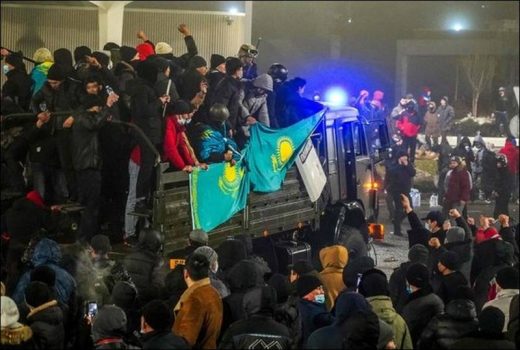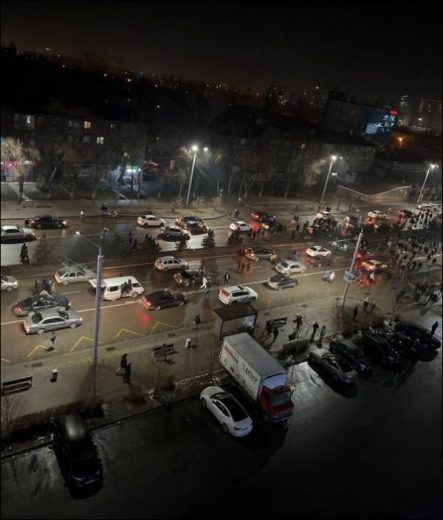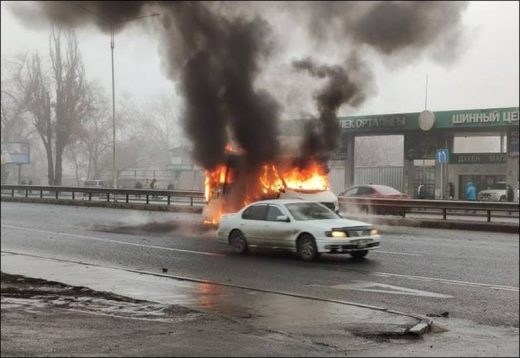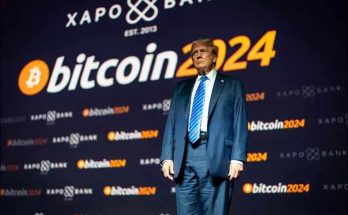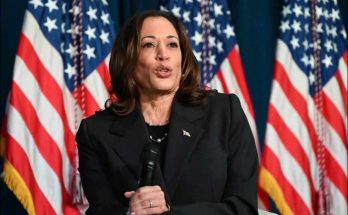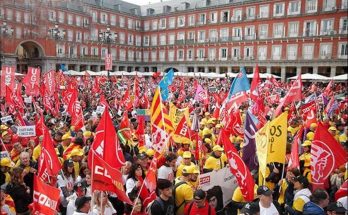Kazakhstan is the largest country in Central Asia with 2,800,000 km2. It has a very large geography. The underground is very rich. There are enormous gas and petrol deposits. 40% of the world’s uranium reserves are in Kazakhstan. It has strategic mines such as iron, copper and chrome. Also, one of the most important future warehouses of Kazakhstan. Kazakhstan stands out in cultivation, which is in a very strategic agricultural area with its wide steppes. It is neighbor to superpowers like Russia and China. Russia’s Baikonur Cosmodrome is there and a lot is going on. Russia is testing nuclear weapons in Kazakhstan.
In this wide geography, two-thirds of the population consists of Kazakhs. The second largest ethnic community is Russians with 25-30 percent. In addition, 72 nationalities live, from Germans to Koreans. Kazakh and Russian are the official languages. Steps were taken to remove Russian from being the official language and to make Kazakh dominant. The last situation will probably bring back from this decision. The Russians captured Kazakhstan in the 1700s. During the period of the Union of Soviet Socialist Republics of Kazakhstan (USSR), it continued to exist as the “Republic of Kazakhstan”. It was among the countries that became independent after the collapse of the USSR in 1991.
Since 1991, Kazakhstan has been governed by Nursultan Nazarbayev, a former member of the Politburo and the founding president of the country. Nazarbayev acted wisely and strategically, unlike other Central Asian countries and post-Soviet countries. He opened the country to the world and made big investments. He gave importance to education and development. It did not allow ethnic divisions and extremism. China followed a policy of balance between the USA and Russia. He got along well with each of them, but did not leave the country to the initiative of a single great power. It is written in the Constitution of Kazakhstan that the state is a “secular, democratic, unitary” state.
However, as we have seen in many states in practice, the “democratic” part was on paper. Because it was not possible to talk about a pluralist, participatory democracy in the country. But for a long time, Nzarbayev was respected and looked upon with love, as he made great contributions to the country and passed the tough tests successfully and unscathed. Nazarbayev, of course, had an authoritarian one-man rule, but was relatively fair, valued merit, prioritized the interests of the country, and most of the Cossacks were allied that Nazarbayev was doing good work. Because, incomparable with other Central Asian countries, the country brought prosperity, peace, and developed it. Of course, this had the effect of rich underground resources.
Nazarbayev, the legendary founding leader of Kazakhstan, a gentleman with a constructive personality, realized that he was actually disconnected from the people and that the love for him was gradually turning into hatred. His age was also advanced, he sort of retired himself in 2019. He stepped aside as honorary and founding president. But as the head of the National Security Council, he kept his influence on the country and strategic institutions.
He supposedly withdrew from the presidency and left the seat to Tokayev, who was a reformer, intellectual and had a constructive personality like himself. But administration in Kazakhstan had become more complex. Because Nazarbayev and his family and surroundings did not leave the tutelage over the country, they did not abandon the possibilities and power. They just put another layer between them and the public. Since Tokayev, who became the president, could not use his powers and power, he could not remove the Nazarbayev family from power. He even took some steps to woo them. He changed the name of Astana, the capital of the country, to “Nursultan”.
Nazarbayev was given life-long immunity from prosecution. Nazarbayev was made a kind of “Eternal Chief”. However, the government distanced itself from the people. At the top was the Nazarbayev family, irresponsible but controlling capital and power. Under him was the president, Kassym Tokayev, who had to manage both his administration and the Nazarbayev family, while trying to make democratic reforms. Tokayev was also partly authoritative and partly irresponsible. The prime minister and cabinet, under the supervision of the President, were primarily responsible.
The government, which was responsible but not authorized, the whipping boy of both Nazarbayev and Tokayev, was directly responsible to the people, dealing with the people. The logic of this absurd and complex system was the effort of authoritarian people-administrations not to make themselves responsible by using the authority. But at the end of the day, it was inevitable that this system would explode and be met with public hatred. As a matter of fact, it happened. The enraged public knew that Nazarbayev, whom they loved so much until yesterday, was still influential and demolished his statues.
In the last 30 years Kazakhstan has developed. Modern highways, bridges, airports, luxury residences and fascinating cities were built in the country. Due to its underground riches, it was on the way to become the Switzerland of Central Asia. The per capita income was around 10,000 dollars. However, there was no balanced income distribution. While some were in luxury, some were struggling with hunger and poverty. The fact that a gas producing country increased its gas prices by 100 percent infuriated the lower-middle class, the working class, with poverty and deprivation. Civil protests broke out in the western part of the country, where the gas fields and the working class live widely. It soon spread throughout the country and became uncontrollable.
According to my sources, the civil protests were manipulated and spiraled out of control by professional armed units. Snipers stepped in and killed both the people and the security forces. As a result, the Tokayev administration could not suppress the protests and called upon the Collective Security Treaty Organization, which was established under the leadership of Russia and consisted of post-Soviet countries such as Kyrgyzstan, Belarus, Kazakhstan, Tajikistan, for help.
Russian and Belarusian forces landed in Astana and ensured the security of public institutions. A state of emergency had already been declared and the security forces had been ordered to “shoot”. Probably after a while, security will be provided. But Kazakhstan will continue on its way as a less independent country, more under Russian influence. We hope and wish that the brotherly Kazakh people will get through this difficult period. It will have better days, a more democratic, just and peaceful administration. We hope that the Tokayev administration sees what it takes to break away from the people and make reforms that are grounded, take the people into account, and increase participation and accountability.
It was the understanding of government that confused Kazakhstan, detached from the people and reality, and degenerated. Although authoritarian governments are fair for a while, they cannot remain fair and clean for long. The environment of the leader and his children become dirty and cause social outbursts. Great powers can easily intervene and manipulate an administration that has lost contact with the people and a country that has become unstable.
Views: 667
